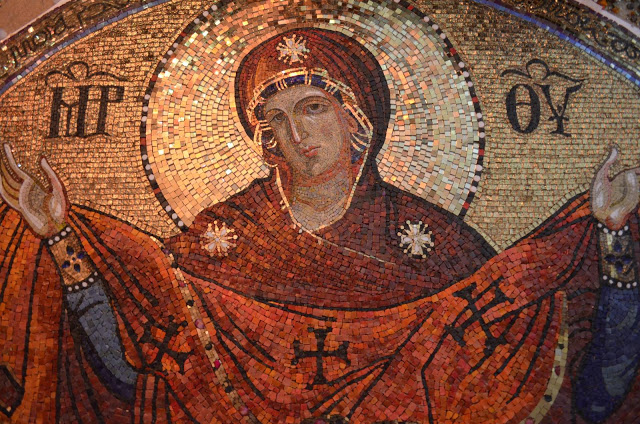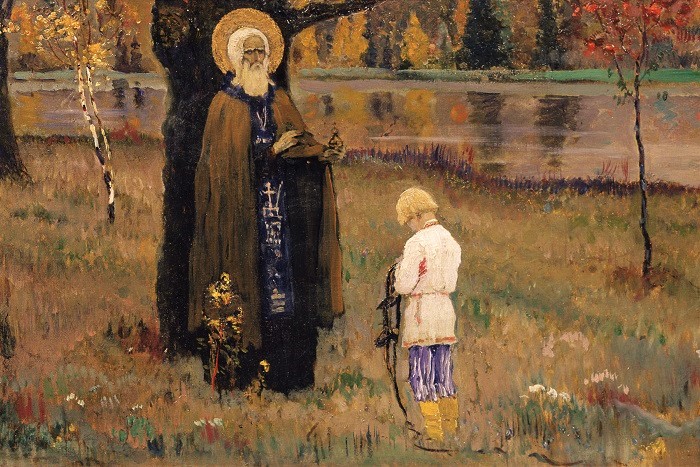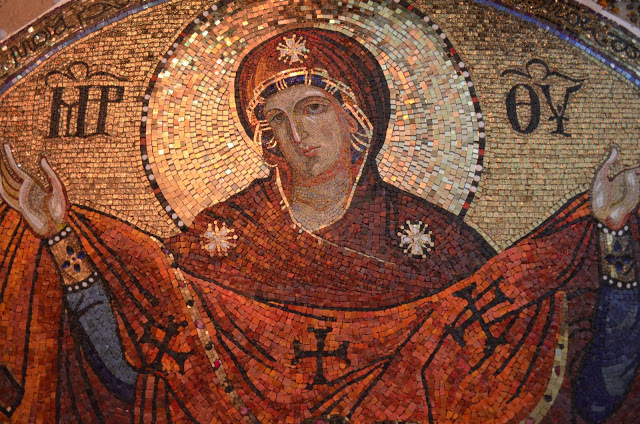
People who do not go to church have been perplexed by the veneration of the Most Holy Mother of God for centuries. Many of them accuse the Orthodox Christians of some kind of idolatry. Some denominations, such as Evangelicals, refuse to honor the Blessed Virgin Mary altogether. What does the Church have to answer to her opponents? Why does She call upon the Theotokos in prayer so often?
Here is how Saint Ignatius Bryanchaninov (1807–1867) who was one of the most famous theologians and saints of the 19th century, addressed many of these issues.
He even wrote a very detailed treatise on Church veneration of the Virgin Mary because Pope Pius IX had announced a new doctrine of Immaculate Conception of the Mother of God. Another reason for writing that treatise were the requests of his contemporaries to provide a definitive rebuttal of the Protestant and secular arguments against the said veneration.
Why Do Christians Venerate Theotokos So Much?
It is because Virgin Mary gave birth to God himself. She was the only person in the world in whom the Creator of the world dwelt. Other great righteous men and women received Divine inspiration thanks to the Holy Spirit, of course, but the Mother of God was the only person who received the Logos so that He could become incarnate.
Saint Ignatius Bryanchaninov writes, “This kind of receiving God is obviously the once-in-history, exceptional, unparalleled phenomenon, unreachable for holy men and for holy angels, and appropriate solely for the Mother of God. The God-man replaced Adam and became the originator of the tribe of the elect; likewise, the Mother of God replaced Eve and became their mother. The God-man is the King of Heaven, of all men and angels; likewise, the Mother of God is the Queen of Heaven, the Queen of all men and angels.”
Why Is Theotokos Honored More Than All Saints?
The high status of the Theotokos is due not only to the fact that She became the mother of the God-man but also to the fact that She was the only person who stayed in close contact with God for such a long time, as Saint Ignatius writes, “The Ever-Virgin is higher than all holy men both because She became the Mother of the God-man and thanks to the fact that She was the most persevering and the most attentive learner of the doctrine that the God-man preached. The first of this qualities was bolstered by the second one, and thus the status of the Mother of God became the most exalted one. This is what the Holy Gospel points out with regard to the Mother of God, ‘Mary kept all these things, and pondered them in her heart’ (Luke 2:19).”
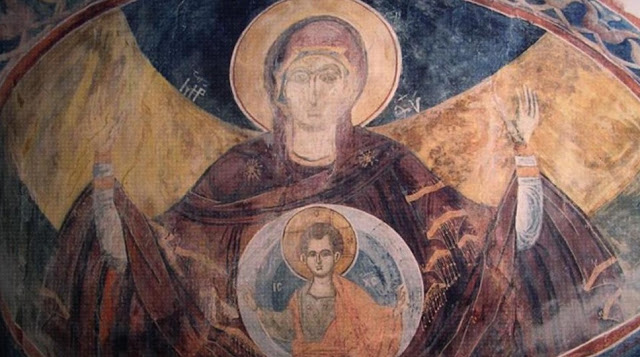
What Is The Greatest Contribution of the Theotokos?
The main contribution of the Blessed Virgin was that She made herself ready for carrying the Savior. It was her personal and voluntary act of self-sacrifice. Her chastity, profound love, complete self-denial, and absolute loyalty to God set her apart from all righteous men and women of the Old Testament.
Saint Ignatius writes: “What the greatest God’s servants aspired to accomplish, the Mother of God actually accomplished, thanks to the God-sent Divine grace. How did she carry it out? At first, her heart and womb were overcome with the Holy Spirit. Then her womb became the Temple of the Incarnate Lord: the spiritual joy pouring from the presence of the Lord engulfed her entirely, according to her own words. As a rule, holy joy engulfs those humans who had been lucky to feel the power of the Holy Spirit, so it is natural that the Theotokos was filled with the divine joy.
As soon as the God-man was born, She was the closest person to him. It was in her lap and in her arms that He spent his early childhood; He was inseparable with her not only during his adolescence but also in his youth and as an adult — up until the beginning of his public ministry, which lasted for three and a half years. There wasn’t anyone who heard the word of God for so long and so closely. There wasn’t anyone who followed the words and actions of the God-man with equally deep and permanent attention and preserved them so meticulously and lovingly.”
Why is Virgin Mary Called Mother of God? How Can Anyone Give Birth to the Eternal God?
Jesus Christ born by Virgin Mary is fully God and fully human at the same time. According to the doctrine officially proclaimed at the 4th Ecumenical Council, his two natures — human and divine — are manifest in him unconfusedly, unchangeably, indivisibly, inseparably.
Saint Ignatius writes: “The Virgin, having conceived and delivered God and man in the same person, became the Mother of God in the exact sense of this word because her offspring was God, while at the same time being a human being. St. John of Damascus exclaims, ‘Having given birth to God who was incarnated through her, how isn’t She the Mother of God?’ The Virgin who became the Mother of God naturally becomes the Lady, the Queen, and the Domina of all sentient beings, on earth and in heaven alike; but at the same time She continues to be a God’s creature and her Son’s and God’s handmaid. By giving birth to the Sacrifice for the sins of the whole humankind, She gave birth to the Sacrifice for her own sins as well, for She is part of the human race, too. Her Son is God, the Creator, the Lord, the Redeemer, and the Savior.”
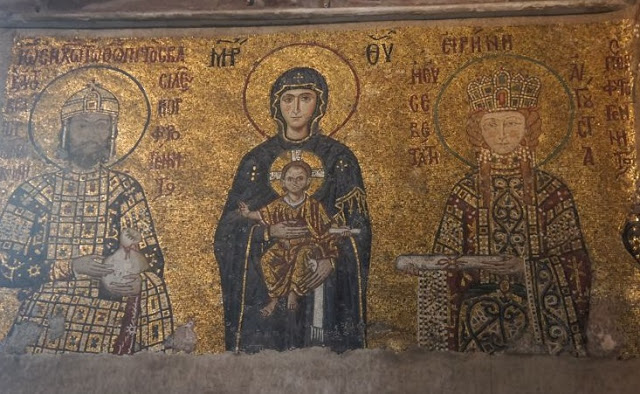
Why Does The Orthodox Church Refuse to Believe in the Immaculate Conception of Virgin Mary?
Pope Pius IX of Rome issued an edict on December 8, 1854, which promulgated the doctrine of the Immaculate Conception of Virgin Mary as an official teaching of the Roman Catholic Church. According to the doctrine, the Mother of God was born without the original sin, i.e., She was absolutely sin-free. The Orthodox Church rejects this doctrine and believes that it contradicts the soteriology (doctrine of salvation) shaped in the age of Ecumenical Councils. In fact, Theotokos herself professes Jesus Christ as her Savior in the Gospel according to Luke.
This is what Saint Ignatius writes: “The graceful Ever-Virgin claims that the God She brought into this world is her Savior. The Papists ascribe sinlessness to Her and by virtue of this claim demonstrate their disbelief in God’s omnipotence. On the contrary, the Orthodox Church praises God’s omnipotence and supreme power that made a female conceived and born in sin incomparably greater than the Cherubim and incomparably more glorious than the Seraphim who have never known sin and who remain steadfast in holiness. My soul doth magnify the Lord, and my spirit hath rejoiced in God my Saviour (Luke 1:43), the Blessed Virgin said in response to Elisabeth when the latter, inspired by the Holy Spirit, spoke out in the loud voice that the Ever-Virgin was the Mother of God.”
Why Do Christians Address Theotokos As Mother?
During his Passion, the Lord declared Apostle John the Theologian, who was standing by his Cross, an adopted son of Jesus’s Mother, and therefore all members of the Church are also her children. We read in the Gospel, “When Jesus therefore saw his mother, and the disciple standing by, whom he loved, he saith unto his mother, Woman, behold thy son! Then saith he to the disciple, Behold thy mother! And from that hour that disciple took her unto his own home” (John 19:26-27).
“When the Lord had already redeemed the human race,” Saint Ignatius writes, “and was about to seal the act of redemption with his voluntary death on the Cross, there was the Mother of God together with his beloved disciple, Apostle John, standing nearby. The Lord suddenly speaks to the Theotokos who was taking part in his redemptive agony. He entitles her to certain rights concerning the humankind; the rights that She receives from the God-man having earned them for her attitude and relationship with the God-man. He declares her the mother of the beloved disciple, and through him—the Mother of the entire renewed human race, according to the opinion and exegesis of the Fathers.”
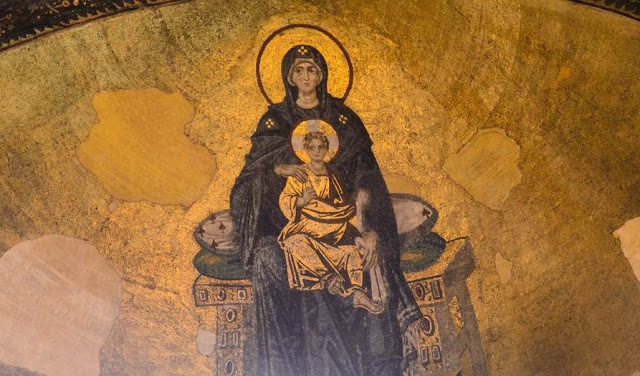
Why Does The Church Pray to the Theotokos So Often?
Christians believe that the Mother of God rose from the dead and that God took her into the Heavenly Kingdom after her death. She became our main intercessor and supplicant for the whole Church. It is for this reason that there have never been any kind of relics of the Theotokos in the Church anywhere, even though parts of her robe and belt are considered sacred.
Saint Ignatius writes: “The Mother of God rose from the dead on the third day after her blissful Dormition. She now dwells in the Heaven both spiritually and physically. Not only does She dwell in the Heaven but She even reigns in the Heaven. Being the Mother of the King of Heaven, She carries the title of the Queen of Heaven, the Queen of holy Angels and holy men. She received special powers and special courage to intercede for the human race before God. The Holy Church asks all greatest servants of God, all Angels and Archangels, to ‘pray to God for us’ but asks the Mother of God to ‘save us’.”
Translated by The Catalog of Good Deed

